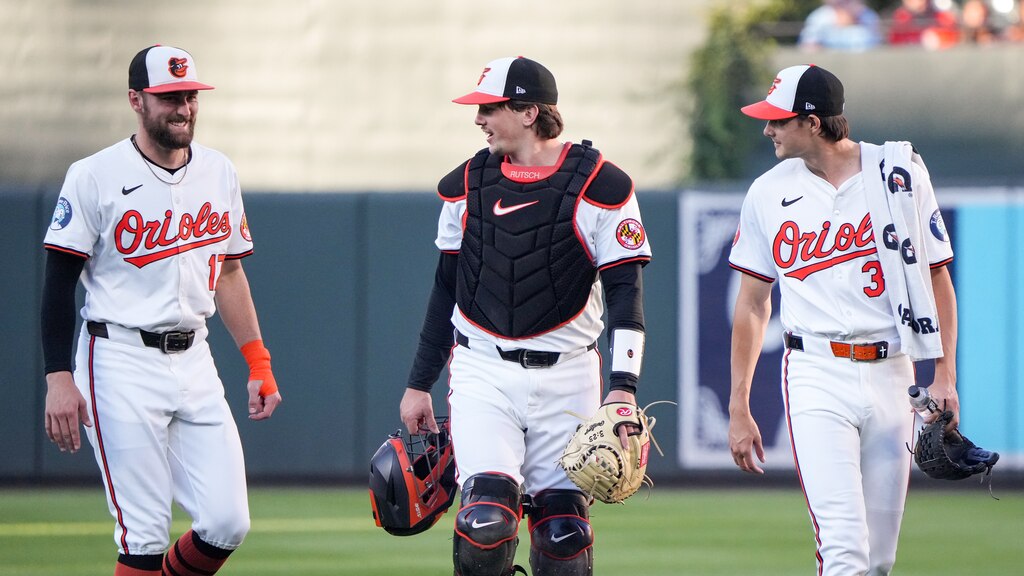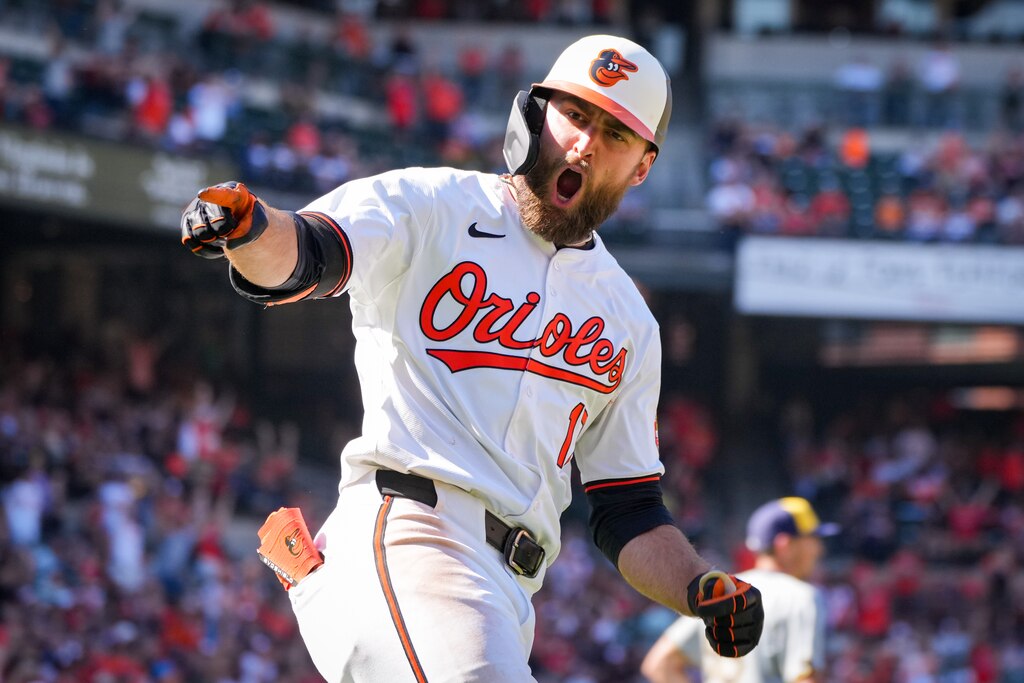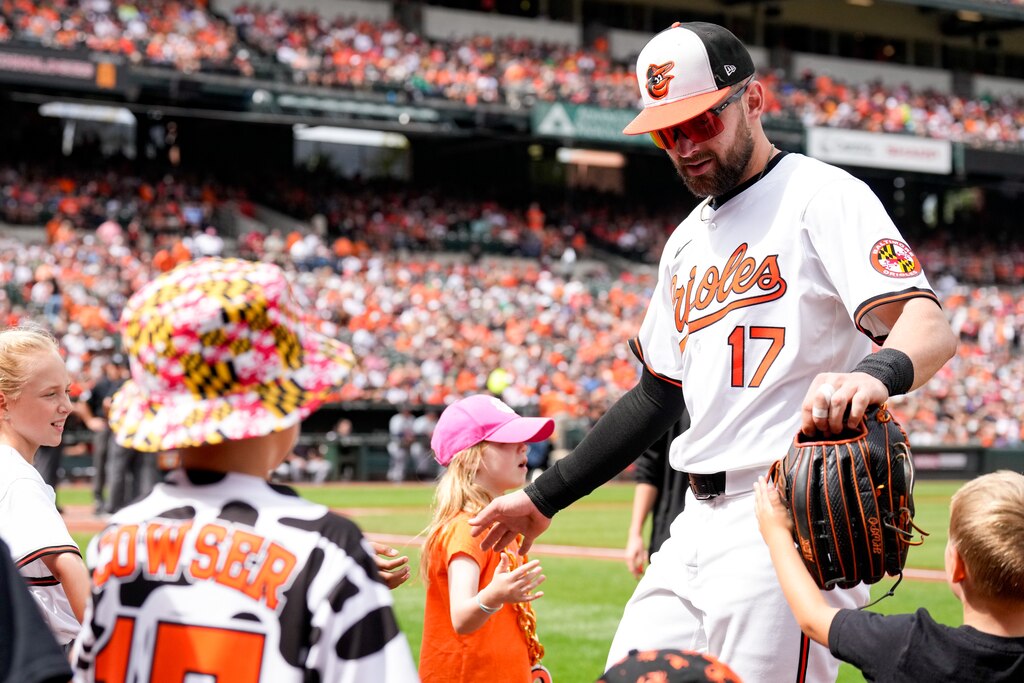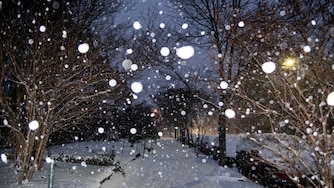As they sat inside Nebraska’s Memorial Stadium last month, Lance Harvell could see the physical change in the kid — no, the man — sitting next to him. No longer was Colton Cowser the long, lanky teenager he first saw at a Sam Houston State baseball showcase as a 16-year-old. His clothes no longer hung like a tarp over his frame.
But upon second glance, the former Bearkats director of recruiting saw the kid within. Cowser, a 24-year-old who’s in the running to be named the American League Rookie of the Year on Monday night, laughed and joked with Harvell’s 9-year-old son as if nothing had changed.
“Same dude, man,” Harvell said.
That, above anything else, could be Cowser’s greatest accomplishment to this point. Forget the rapid rise to prominence for the once-overlooked teen; disregard the fifth-overall selection made by the Orioles in 2021; take no notice of the 24 home runs Cowser slugged as a rookie in Baltimore. As they watched the Cornhuskers play football, Harvell was relieved to see Cowser hasn’t changed.
“That right there, him being the same down-to-earth kid from Houston who was overlooked by everybody,” said Harvell, who’s now the baseball recruiting coordinator at Nebraska. “If you want to call it a chip on your shoulder, whatever, but he had maintained that consistency in who he is, and I think that has carried him more than just his talent.”

That’s the person his Orioles teammates came to know, too. Next to his gloves and bats and cleats, Cowser always keeps a box of Legos. He’ll walk through the clubhouse with a smirk, as if repressing the urge to say a joke aloud, and he looks as at home running around with James McCann’s twins as he does with Gunnar Henderson, one of his best friends and locker mates.
And on the field, the smirk might remain — but there’s another edge to it. An edge that helped him overcome the doubts that followed him in high school, or the slumps that struck for the first time when he arrived in the minor leagues. He’s learned to adapt, and made adjustments on the fly this season that helped him tie for the lead in home runs among rookies.
Cowser could be forgiven if any of this went to his head. He was undersized as a sophomore at Cypress Ranch High School, a powerhouse program just northwest of Houston. He arrived on Sam Houston State’s campus at 18, still unable to fill out his jersey. He went on to become a freshman All-American and made the Team USA baseball team. When he sat next to Bodie, Harvell’s 9-year-old, to watch college football a few weeks ago, Cowser was coming off a standout season in Baltimore just three years after he became the Orioles first-round pick.
But that was all out of Cowser’s mind. There was Bodie to catch up with. There was Harvell, who was instrumental in steering Cowser to Sam Houston State — a decision that helped vault Cowser on his upward trajectory.
Harvell and then-coach Matt Deggs knew, to some extent, this was possible. But to explain how it occurred? That’s less straightforward.
The easy answer, Harvell said, would be to credit Cowser’s talent alone. But there are many talented players — they proliferate through baseball, and some stick and some don’t, regardless of their natural abilities.
Then what is it?
“I haven’t had anyone like him, because he’s got the right temperament,” said Deggs, who now is the head coach at Louisiana Lafayette. “It’s never about Colton. Ever.”
Even if, more so than ever, Cowser is the center of attention.

‘This cat may be different’
Deggs doesn’t know if it ever really crossed Cowser’s mind, but it certainly crossed the mind of the Sam Houston State coach. When Cowser arrived that fall, a true freshman coming off a stellar season at Cypress Ranch High School, the first two weeks of camp were hell.
“I didn’t know if he’d make it through,” Deggs said. “I thought, ‘Man, this kid is about to tap at any second.’”
It’s a rigorous program Deggs ran, with heavy lifting and stamina-building on top of the usual baseball training regimen. And Cowser, still growing, struggled for one of the first times in his baseball life. But he didn’t quit; instead, in scrimmages with Rice and Texas A&M, Cowser hit a higher gear — and in doing so, he proved Deggs right to make Cowser the youngest player to accept a scholarship offer during his five years as coach there.
“I was like, ‘This cat may be a little different.’ So thank God he stuck with it,” Deggs said.
That continued a trend for Cowser, whose disposition has allowed him to ride the highs and lows of baseball at an equilibrium.
That resilience was vital when Cowser, as a high school player, was passed over by top college coaches who thought his ceiling was not high enough. The large Texas schools saw a late-bloomer, said then-Cypress Ranch coach John Pope, and sought what they thought were more sure bets. And even though Sam Houston State offered Cowser a scholarship immediately entering his junior year, coaches thought they were getting a raw player who would need time, and corrective coaching, to become productive on the field.
“He looked a little goofy, you know,” Harvell said. “Like a baby giraffe on roller skates out there.”
But as Sam Houston State discovered, giving Cowser an opportunity was prudent. They heard, more than saw, potential when Cowser stood in the box — the loud contact off his bat made Deggs and Harvell wonder how a gangly teen could pound a ball so hard. His swing, helped along by longtime hitting coach Sid Holland, was pure.
“We covet speed and strength, and it doesn’t matter what you’re doing at the time as far as numbers,” Deggs said. The players didn’t need to be refined, and if they were, the likes of Sam Houston State would likely be an outsider to land them.
There was uncertainty around Cowser, though, because schools didn’t see him as a long-term third baseman, where he played during his sophomore year at Cypress Ranch. But bats tend to find a way into the lineup regardless, and he soon settled in the outfield. And the more plate appearances Cowser received, the more he proved putting a lid on his potential was a waste of time.
“I think a lot of the big schools in Texas are looking for the finished product, not the prospect,” said Dale Cowser, Colton’s father. “And I’ll give a lot of credit to Matt Deggs. … He was the only coach, the only person, to say, ‘I see what Sid sees in this kid.’”

After two difficult weeks to begin fall camp at Sam Houston, Cowser settled at the college level. The recognition, finally, followed. He became a Team USA player the summer after his freshman year. He returned to Sam Houston State to perform at high levels for two more seasons. He was a surprise top-five pick in the 2021 draft, but not a completely unknown commodity.
“The thing that kind of separated him from everybody was, he just kept getting better,” Pope said. “The more he played, the better he got.”
It led him to the minor leagues as a well-regarded prospect. Still, he went through the same adjustment period Deggs first saw at Sam Houston State.
Cowser opened the 2022 season with the Orioles’ High-A affiliate, the Aberdeen IronBirds. It’s a notoriously difficult park to hit in, and while Cowser finished his 63 games there with a .258 average, his time was riddled with slumps. His first taste of Triple-A ball was also a challenge; he hit .219 in 27 games to end 2022.
And in 2023, when Cowser received a taste of major league ball, he hit .115 in 26 games.
“Watching him struggle in the big leagues, it was difficult, no doubt,” Dale Cowser said. “But I’ve also been a firm believer that if you fail, if you fail and struggle and don’t learn from it, then it’s a wasted opportunity.”
It didn’t rattle Cowser. He attacked the offseason with Holland, excelled in spring training and won an opening day roster spot. And after the All-Star break, to counteract a slump that began midway through the summer, another adjustment catapulted Cowser to Rookie of the Year consideration. He picked up a slightly longer bat, with a bit more weight, and hit .268 in his final 65 games.
It would’ve been difficult to notice in the clubhouse when, exactly, Cowser’s performances picked up. He laughed and joked when appropriate; he grinned in the batting cage, devouring advice on ways to improve. In that way, Cowser once more stayed true to himself.
“Baseball people knew this was going to be a dude,” Deggs said. “It was just a matter of time.”

A superfan is born
The ball was nearly at his head. If Cowser hadn’t swung, it might’ve hit him. But the ring of Cowser’s metal bat on that cold day in March 2019 both validated his place in the starting lineup at Sam Houston State and won the freshman a lifelong fan.
Cowser had plenty of moments earlier, too, that reinforced his position. During two fall scrimmages, Cowser played well against Texas A&M and Rice, despite only arriving on campus weeks earlier. But this was on a larger stage, playing at the minor league stadium of the Frisco RoughRiders against Nebraska, and the ball off Cowser’s bat kept rising until it hit a frozen swimming pool beyond the right-field fence.
Beyond that swimming pool stood a 3-year-old Bodie. He was behind glass in the meeting room of an apartment complex, watching from the warmth. But when Cowser hit that two-run homer as part of Sam Houston State’s early-season win, the boy was hooked.
So was the coaching staff.
“We knew, like, this kid’s talented,” Deggs said. “But he’s your typical freshman, right? And sometimes it takes a minute. But not for him. When the lights came on, he had a fifth gear, and he went there pretty quick.”
Cowser learned from an experienced group of starters while playing all 56 games. In those games, Cowser hit .361 with a 1.052 on-base-plus-slugging percentage. Deggs waited until midway through that spring season before he began making some calls to Team USA personnel, but he had seen enough to know Cowser warranted a place among the best college players in the country. He proved his worth there, too.
Cowser was one of three freshmen to make the 26-man Team USA college roster, and he earned MVP honors at the end of a five-game series against Cuba in which he hit .438. Then he joined the national team for series in Taiwan and Japan.
By that point, Deggs and Harvell were departing Sam Houston State. Deggs returned to Louisiana; Harvell went to Nebraska.
But that home run ball stuck with Bodie, Harvell’s son. And while Bodie couldn’t quite say Cowser’s last name correctly, he became the first superfan of Cowser’s life.
One day in Lincoln, a box from Japan arrived. Inside it, there was a signed Team USA baseball card from Cowser. He added a signed ball, a hat and a package of miso soup for the Harvells to try. On a note, Cowser wrote: “Give this to Bodie.”
“He’s over there having the time of his life, a once-in-a-lifetime opportunity, and he’s thinking about my 3-year-old son,” Harvell said.
If Harvell was surprised at that moment, he would soon learn that was Cowser’s way. When Cowser was drafted fifth overall, he called Harvell. His former coach jokingly asked if the fancy first-rounder was flying on a private jet. Nope. Cowser was eating alone in a Jersey Mike’s.
And even now, with a Rookie of the Year award a possibility, Cowser sat in the stands at Memorial Stadium with Harvell and Bodie as if nothing had changed.
In a sense, nothing has.
“He’s the same goofy kid we recruited when he was 16 years old,” Harvell said.





Comments
Welcome to The Banner's subscriber-only commenting community. Please review our community guidelines.